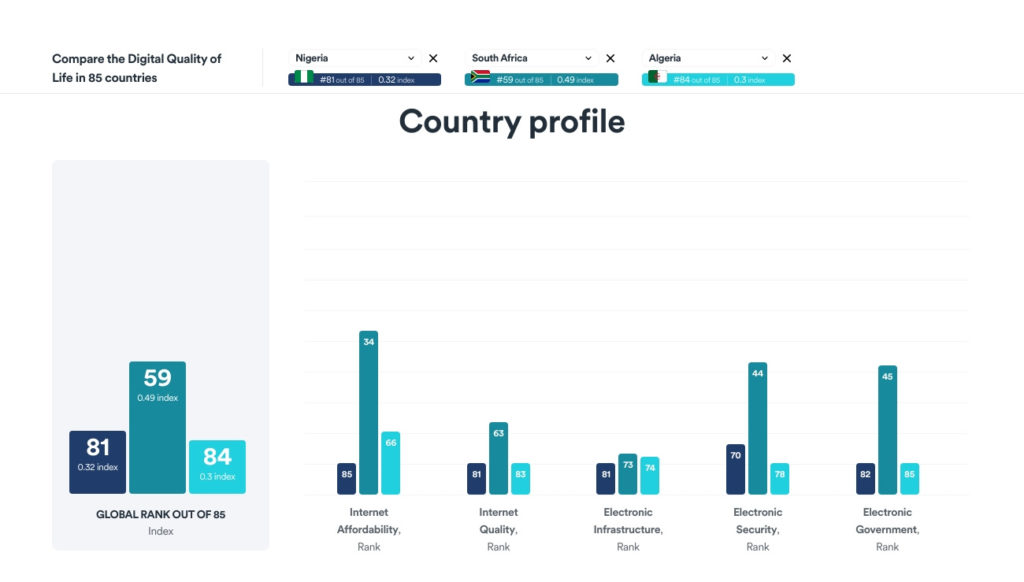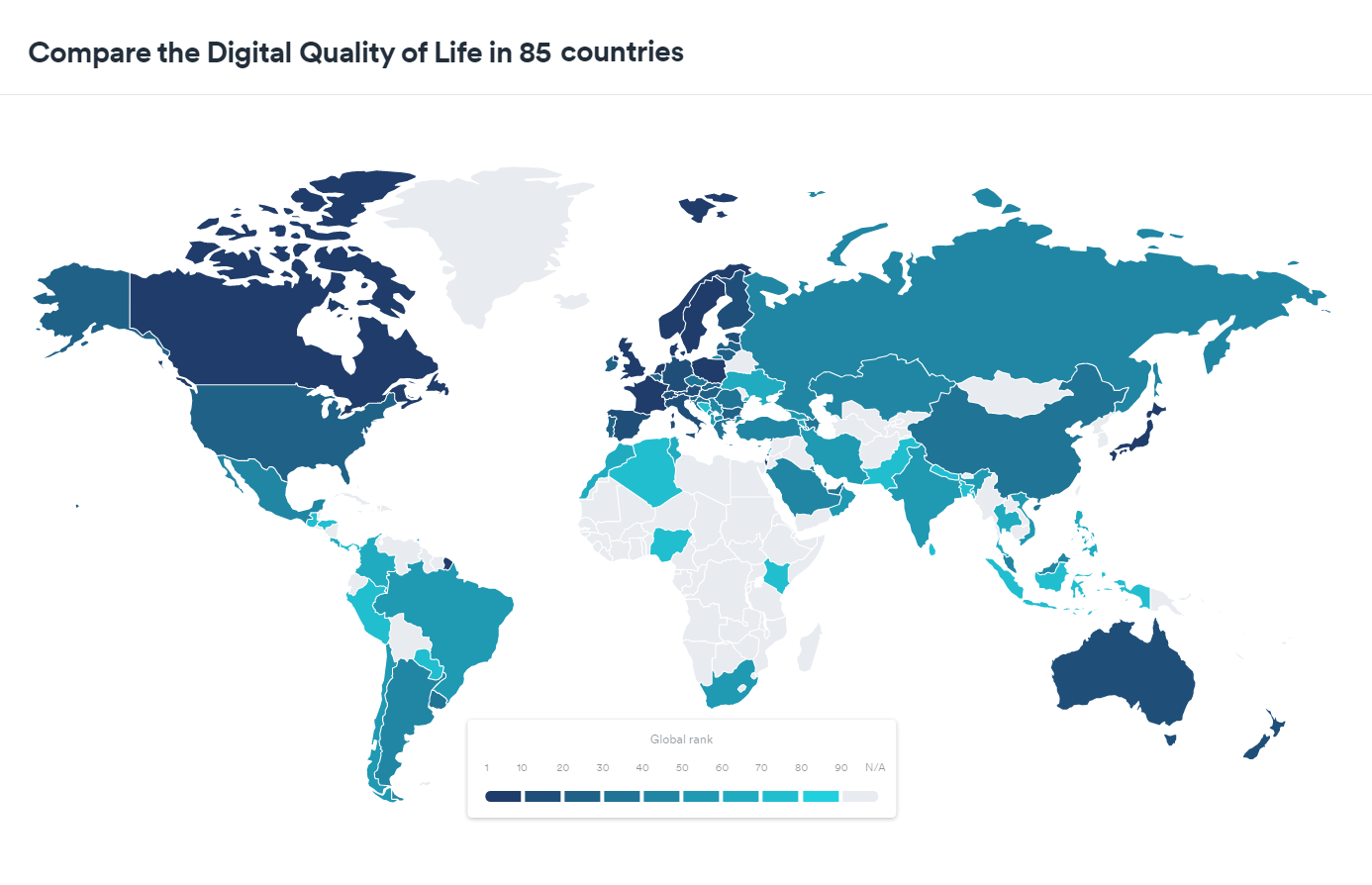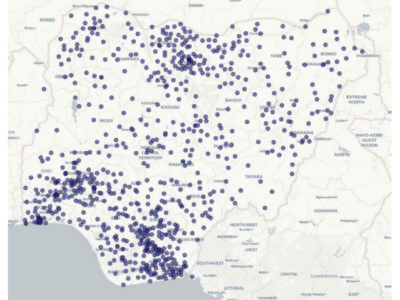Nigeria is at the bottom of the Digital Quality of Life (DQL) Index 2020,The country is ranked 81st in the world, according to the 2020 results of the DQL research. South Africa is ranked the first in Africa and 34th in the world. South Africans enjoy the highest quality of digital living.
In all, the DQL Index 2020 covers 85 countries indicating that Nigeria performs extremely poorly. The study covers 81% of the global population (6.3 billion people).
While Africa’s largest economy rests at the bottom of the DQL Index 2020, it surprisingly ranks high on e-security and takes the 70th place globally. Even though, it ranks 53rd in terms of cybersecurity, the study says Nigeria still lacks proper data protection laws.
Nigeria’s principal data protection legislation is the Nigeria Data Protection Regulation 2019 (“NDPR”). The NDPR was issued by the National Information Technology Development Agency (NITDA). There are ongoing legislative moves to create more robust data protection laws and a commission to oversee data protection in the country.

Here’s the key findings on Nigeria:
- Out of all African countries, analysed in the research, Nigeria surpasses Algeria, however, lags behind Kenya, Morocco, Tunisia and others. Algeria ranks 84th while Kenya is in the 77th place, Morocco – 70th and Tunisia – 64th.
- While Nigeria ranks at the bottom of the DQL Index 2020, it surprises in terms of its e-security ranking. Nigeria is in the 70th place globally — it ranks 53rd in terms of cybersecurity, however, has no data protection laws available in the country.
- When it comes to internet quality, Nigeria ranks at the bottom of the pillar — in the 81st place. However, It has a better quality internet than Peru, Algeria, Philippines and Sri Lanka.
- Nigeria has the least affordable internet globally. It ranks below Columbia and Honduras in terms of internet affordability.
Scandinavian countries excel in offering high-quality digital well-being to their citizens
The Digital Quality of Life (DQL) index is published annually based on research conducted by the privacy protection company Surfshark. Researchers measure internet quality, affordability, e-security, online government services, and e-infrastructure.
The DQL Index provides insight into how people’s overall welfare is influenced by their digital well-being.
This year’s edition of the DQL research concluded that 7 out of 10 countries with the highest digital quality of life are in Europe, with Denmark taking the global lead among 85 countries.
Regionally, Canada stands out as a country with the highest digital quality of life in the Americas while Japan takes the leading position in Asia. Among countries in Africa,people in South Africa enjoy the highest quality of their digital lives whereas New Zealand leads in Oceania, outperforming Australia in various digital areas.
Key global findings of the research:
➔ The COVID-19 outbreak had a significant impact on internet stability. 49 of 85 countries experienced drops in mobile and 44 in broadband speed due to the WFH setting.
➔ High inequality in affordability: people in 75% of the researched countries have to work more than the global average to afford the internet.
➔ E-security, e-infrastructure, and e-government have a more significant correlation with the digital quality of life than GDP per capita.
“Any country’s digital advancement and people’s online experiences have tangible relation to its economic potential and population’s overall wellbeing. To demonstrate this coherence, we are continuing our annual Digital Quality of Life research project that investigates multiple factors influencing people’s online experiences,” explains Dom Dimas, Head of DQL research at Surfshark.
“The index aims to overlook any country’s digital preparedness’s status quo and establish a common ground for further conversation.”
The researchers found out that the best quality internet in the world is in Singapore, followed by Sweden and the Netherlands.
The internet, combining both mobile and broadband, is most affordable in Israel, Canada and Azerbaijan.
The United Kingdom, France and Lithuania stand out globally for their e-security while Singapore, the UK and the US lead in the advancement of e-governance services.
The last pillar examining the countries by their electronic infrastructure development level ranks the United Arab Emirates, Sweden and Denmark as global leaders in this area.
The Digital Quality of Life study showed that none of the researched countries crossed the threshold of 0.8, and no country made it to the top three in all of the pillars, reflecting room for improvement in all digital areas.
The DQL research examined a total population of more than 6.3 billion people in terms of twelve indicators grouped into five pillars. The study is based on information provided by the United Nations, the World Bank, Freedom House, the International Communications Union, and other public data sources.
The Top 20 countries in the 2020 DQL index are (in the descending order):
Denmark, Sweden, Canada, France, Norway, Netherlands, United Kingdom, Israel, Japan, Poland, Finland, Singapore, Estonia, Austria, Switzerland, Germany, New Zealand, Spain, Australia, and Italy.
The final 2020 Digital Quality of Life report and an interactive country comparison tool with country-level reports can be found here: https://surfshark.com/dql2020.





























